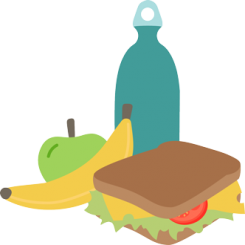Students & parents
If you’ve already mastered refusing to use single-use plastic at home, what’s next? There’s more you can do to make a positive difference.

What you can do
Many people who have already mastered refusing the big 4 plastics at home (plastic bags, drink bottles, coffee cups and straws) ask ‘what’s next?’
It’s great that you’re excited to challenge yourself to do more – and you can! Sharing Plastic Free July at school is a great next step
How you can do it
There’s a lot of power in sharing your ideas and solutions with fellow students and parents in your school. Inspire others with how you’ve refused single-use plastic with wax sandwich wraps, homemade snacks over store-bought ones wrapped in plastic, reusable water bottles, cardboard pens, plastic free choices from the canteen, and more!
Encourage others by starting to share small ideas. Perhaps they can:
- Take a look at their lunchbox to find one thing they can swap out for a reusable alternative, or;
- Remember to BYO reusable water bottle, cup, cutlery, container, etc., or;
- Choose to refuse canteen items that are wrapped in plastic.
Beyond inspiring other students and parents, consider joining the sustainability committee at your school. If there is no sustainability committee, then why not set one up! See our Getting Started at School card to learn how.
Many people share the challenge using Plastic Free July’s downloadable resources, including posters you can put up around your school.
Finally, you could talk to your teachers about getting the whole class or school involved in the Plastic Free July challenge. You can refer them to our For Teachers card. Remember, if July doesn’t work for your school, you can do the challenge at any time of the year!
Taking the next steps
Lots of people choose to do a stationery audit at the end of the year. It’s a great opportunity to take stock of what you didn’t use and see whether it can be reused in the new year, rather than ordering more and wasting items. It can also be a great time to re-evaluate suppliers and see if there are alternatives to products made from or wrapped in plastic – like using highlighter pencils instead of pens, for example.
Another area where you can choose to refuse plastic waste is your school clothes. Are they made from plastic? And, if so, can they be swapped for natural fibres like cotton and wool?
Many people have clothes, stationery and toys that they no longer use. Rather than simply throwing them out, people often hold an event with friends and/or classmates and swap them, or organise to donate them to those in need as a group.
The Impact
- Learning what plastics you’re using on a daily basis, and slowly picking one at a time to substitute with an alternative can have a huge impact over time.
- Helping classmates, or the whole school, to reduce plastic waste will multiply your impact by hundreds or thousands.


